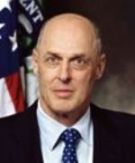Paulson: Financial system stable but crisis in "early days"
 Washington - The US financial system has been stabilized and authorities averted a near-collapse in September that prompted unprecedented government intervention in private institutions, US Treasury Secretary Henry Paulson said in congressional testimony Tuesday.
Washington - The US financial system has been stabilized and authorities averted a near-collapse in September that prompted unprecedented government intervention in private institutions, US Treasury Secretary Henry Paulson said in congressional testimony Tuesday.
But Paulson warned there was still much work to be done to help the financial sector recover and to restrict the credit crisis' fallout into the wider US and global economy.
"This is early days," Paulson told the Financial Services Committee of the House of Representatives. "I think we have turned the corner in terms of stabilizing the system."
In a combative session before lawmakers, Paulson also defended the administration's actions to help struggling homeowners and said he opposed a 25-billion-dollar bail-out of the struggling US auto industry that has been pushed by Democrats in Congress.
The government has already purchased nearly 150 billion dollars worth of shares in US banks to keep them from collapse, as part of an unprecedented 700-billion-dollar rescue package approved by Congress in October.
Paulson said the Treasury expected to hold the rest of the money to provide "flexibility" for the incoming administration of president-elect Barack Obama, who takes office January 20.
Democrats have criticized the rescue plan for being too focused on Wall Street banks rather than curbing a record rate of home foreclosures, but Paulson said stabilizing the financial system had to be the government's first priority.
Paulson warned that the government bail-out package was not a "panacea for all our economic difficulties." Though a collapse of the US financial sector has been prevented, its downturn has already spilled into the wider US and global economy.
The US economy contracted by 0.3 per cent in the third quarter of 2008. The International Monetary Fund has forecast a recession in the world's largest economy, while the
15-nation eurozone and Japan have already reported two straight quarters of negative growth.
The financial crisis nearly spiraled out of control in September, as the bankruptcy of Lehman Brothers Holdings Inc and a host of other bank collapses sent global stocks plunging and froze US credit markets.
Federal Reserve Chairman Ben Bernanke, testifying before the same House committee, said banks began opening up lending again in mid- October but warned "credit conditions are still far from normal."
US automakers have been especially hard hit. Auto sales plummeted 32 per cent in October, the slowest month since 1991, as consumers struggled to be approved for car loans.
The auto industry has already seen 25 billion dollars approved as part of legislation to develop lower-emissions technology but has sought another 25 billion dollars from the financial rescue package to remain solvent.
Democratic lawmakers have pushed hard to give the auto industry the additional funds it wants but have come up against strong opposition from the Bush administration and Republicans in Congress.
Chief executives from the so-called "Big Three" of General Motors Corp, Ford Motor Co and Chrysler LLC were to make their case before Congress later Tuesday.
Paulson said the October bail-out should be strictly limited to stabilizing the financial sector, but suggested more funds could be appropriated under the emissions legislation already passed.
Paulson and Bernanke also took criticism from congressmen for not doing enough to stem a record rate of home foreclosures that lie at the heart of the credit crisis. More than 3 million foreclosures have been reported since 2006 amid a sharp downturn in US home prices.
The National Association of Realtors Tuesday said housing prices fell in four out of every five US cities during the third quarter, the widest spread since records began in
1979.
Paulson defended his announcement last week that he would not use any money from the 700-billion-dollar bail-out to purchase mortgage- backed securities, whose plummeting value sparked massive writedowns by US and European financial institutions and led some to declare bankruptcy.
Paulson said that worsening economic conditions meant the government no longer had enough "firepower" to make an impact in mortgage-related assets, prompting his decision to invest directly in banks instead.
"We went to the heart of the problem. The heart of the problem was the financial system and capital," Paulson said. (dpa)